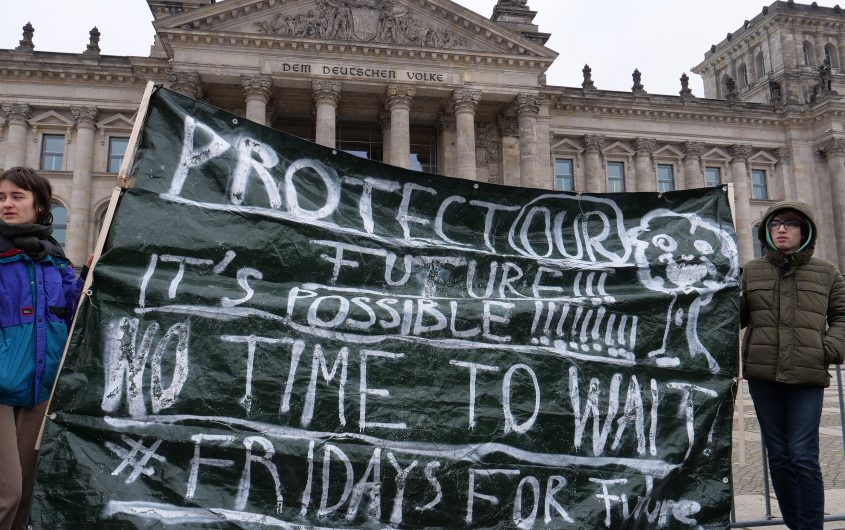
Leonhard Lenz via Wikimedia Commons
Germany’s New “Climate Package”: Too Little, Too Late?

Sonja Thielges
German Institute for International and Security Affairs (SWP)
Sonja Thielges is a Geoeconomics Non-Resident Fellow. She was a DAAD/AGI Research Fellow from mid-March to mid-May 2019 and explored foreign policy interests in Germany and the United States related to the countries’ energy transitions. In Germany, she is a researcher at the Research Cluster Climate Policy and Politics at the German Institute for International and Security Affairs (SWP) in Berlin. Her research interests include climate foreign policy, the global energy transition and industrial decarbonization. Her research has been published in studies, policy papers, online blogs, and academic publications.
Prior to SWP, Sonja was head of the Industrial Decarbonization research group at the Research Institute for Sustainability (RIFS, formerly Institute for Advanced Sustainability Studies, IASS) in Potsdam. She was a visiting researcher at the University of Michigan’s Center for Local, State, and Urban Policy in Ann Arbor in 2014 and previously also worked on projects at the Environmental Policy Research Centre (FFU), the Institut für Europäische Politik (IEP) Berlin, and the Centre International de Formation Européenne (CIFE). In 2017/2018, Sonja was a participant in the AGI project “A German-American Dialogue of the Next Generation: Global Responsibility, Joint Engagement,” sponsored by the Transatlantik-Programm der Bundesrepublik Deutschland aus Mitteln des European Recovery Program (ERP) des Bundesministeriums für Wirtschaft und Energie (BMWi). She completed an MA in North American Studies, Political Science, and Modern History at Freie Universität Berlin and Indiana University Bloomington and holds a PhD in political science from Freie Universität Berlin. Her PhD thesis studied climate policy discourses in the U.S. Rust Belt states.
Early in October, the German government introduced its “climate package.” It is a comprehensive bill aimed at reducing the country’s greenhouse gas emissions and enhancing a sustainable energy transformation, especially in sectors that have not succeeded in these tasks so far: Transportation, buildings, and industry. The bill features annual emission budgets for each sector that are in line with the country’s goal of reducing overall emissions to 55-56 percent below 1990 levels by 2030. Among the proposed measures to support these reductions are a carbon price, a tax break for train tickets and building retrofits, and tax credits for commuters. NGOs and think tanks are heavily criticizing the bill for its lack of ambition and the laxity of its instruments. The carbon price has been deemed far too low to be effective, the compliance mechanisms to enforce each sector’s emission budget as well as the external monitoring mechanisms too weak. Overall, experts agree, the bill fails to trigger the large-scale transformation necessary in Germany to ensure Germany’s compliance with its 2030 targets.
Europe’s Climate Hype
Germany’s climate package, at first sight, is part of a climate hype that is going on in Europe right now. The “Greta effect,” a mobilization of the public triggered by Swedish climate activist Greta Thunberg and the Fridays for Future movement, has spread across Europe. It has grown from youth protests to a full-blown political movement and is playing a crucial role in shaping recent parliamentary elections and political agendas.
“Climate Elections” across Europe
Green parties have broken election records thanks to the climate hype. Switzerland voted last weekend and its Green parties gained a total of 26 seats, capturing more than 20 percent of all votes. In the German coal states of Brandenburg and Saxony, the Green party also gained additional parliamentary seats, while almost all of the established German parties (Christian Democrats, Social Democrats, the Left) have suffered losses. The Greens won 8.6 percent of the votes in Saxony and 10.8 percent in Brandenburg and will become part of the governing coalitions in both states now. In parliamentary elections in Austria in September, the Green party went from 3.8 percent in 2017 to 13.9 percent, re-entering the parliament with 26 seats. At the EU level, the “green trend” was already visible in May’s European Parliament elections. The Group of Greens won almost 10 percent of the vote (74 seats), as compared to 6.6 percent (50 seats) in the elections of 2014.
The German climate package fits into this trend as it reflects the importance of climate issues on the political agenda. But it does not make Germany a sudden climate champion, as it is, first and foremost, a mandatory response to the demands of climate and energy targets agreed at the EU level.
Germany in the EU Climate Framework
Based on its commitments under the Paris Agreement, the EU is obligated to reduce its emissions by at least 40 percent below 1990 levels by 2030. The EU has decided to achieve much of this reduction (43 percent compared to 2005) through emission reductions in the sectors covered by the EU Emission Trading Scheme (EU ETS), which covers large industries and energy. Moreover, the EU members agreed in 2018 to reduce emissions in non-ETS sectors by 30 percent below 2005 levels by 2030. This includes, among others, the transport sector, buildings, and agriculture where, much like in Germany, there has been no stable emissions downward trend. Under the EU’s “Effort Sharing Regulation,” Germany is obligated to reduce emissions to 38 percent below 2005 levels by 2030. For the past years, Germany has consistently failed to meet its annual reduction obligations. It is one of a few EU members that have so far also not been on track to meet the 2020 obligations of reducing emissions in non-ETS sectors by 14 percent.
The Paris Agreement commits its signatories to limit global warming to “well below 2 degrees Celsius.” To put this into perspective: This will not halt climate change. But it will prevent its most severe impacts. However, if all current country commitments under the Paris Agreement are fully implemented, the world is currently headed to a warming of around 3 degrees, as estimates by the Climate Action Tracker indicate. The reality is: Many countries, and this includes Germany so far, are not on track to meet their NDC commitments. In this sense, the climate package was a much overdue effort by the German government, even though it must be seen as an important step for climate protection in Germany.
Climate Backlash?
While on the one hand we know already that global climate protection efforts are still far from sufficient to meet the goals of the Paris Agreement, we are, on the other hand, already confronted with political backlash at this level of ambition. One prominent example is the so-called Yellow Vest Movement in France. The movement emerged in November 2018 as a response to government plans to introduce a CO2 tax on gasoline and diesel fuels to support the country’s clean energy transition. The protesters perceived this tax as an attack on the poor, framing fuel costs as a social justice issue. The government eventually responded to the, at times, violent protests by abandoning the proposed tax. In Germany, the right-wing party Alternative for Germany (AfD) has begun to respond to the climate debate as well. It won many seats in both recent federal and state-level parliamentary elections, introducing climate-skeptic positions into parliamentary and public debates in Germany. The party frames climate protection as an intrusion on individual liberties such as purchasing a car or home heating system of your own choice. It also implies that climate protection hurts poorer households and irrationally burdens the German economy. As these examples highlight, the large-scale measures necessary to maintain a livable planet for future generations are a political and a social challenge.
Transatlantic Implications
All the while, the U.S. federal government continues to show no interest in pursuing climate protection measures and maintains its plans to leave the Paris Agreement. Emissions reductions and clean energy transformations continue to be the domain of states, cities, and non-state actors. At the September UN Climate Summit in New York, the U.S. president was not even invited to speak. The floor was left to climate frontrunners presenting progress. From the U.S. side, the agenda only included Janet Mills, the governor of Maine.
The EU and the U.S. federal government currently have basically no shared interests with regard to climate protection. From a climate protection perspective it is, however, not an option for the second largest global emitter of greenhouse gases to not be included. The U.S. must not be ignored. Based on its existing close ties, the EU needs to develop a strategy for engaging the U.S. in efforts to transform its economy toward sustainability. This strategy need not only focus on climate protection. It can also focus on the important co-benefits of climate policy that are relevant to the U.S. such as job creation, infrastructure modernization, or addressing water shortages. Fostering a more productive relationship with the U.S. on green economy transformation will, hopefully, be an important early task of the new European Commission under Ursula von der Leyen, who declared climate issues a focus of her political agenda. It will also be an important challenge when Germany takes over the presidency of the Council of the European Union in the second half of 2020.









